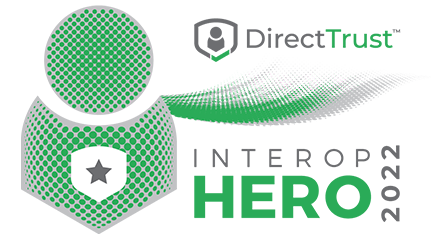
DirectTrust— a nonprofit devoted to advancing interoperabilty in healthcare—has named OpenNotes as an Interoperability Hero for their work to foster and evaluate the spread and implementation of shared clinical notes (“open notes”), and advance healthcare transparency initiatives in the U.S. and overseas. The DirectTrust Interoperability Hero Initiative recognizes organizations, teams, and individuals integral to advancing interoperability initiatives in healthcare. Increasing interoperability means making information exchanges easier and more efficient, one of OpenNote’s core values.
“OpenNotes has always been on the forefront of transparency in healthcare through evidence-based research and best practices that raise the overall standard of care,” said Steven R. Lane, MD, of Sutter Health, who nominated OpenNotes. “Open notes was the only component of the 21st Century Cures Act Interoperability & Information Blocking Rule also accompanied by a deep evidence base supporting its benefit to patients.” Lane also serves on the Health IT Advisory Committee for the Office of the National Coordinator for Health IT.
Twelve years after the launch of the first OpenNotes study, a federal mandate required clinicians to share full medical records with patients receiving health care in the U.S. Known as the “Information Blocking Rule,” this mandate from the 21st Century Cures Act of 2016 requires timely and free access to test results, medication lists, referral information, and clinical notes in electronic formats, upon request. Read: “US policy requires immediate release of records to patients.”
After 10 years and 100 published papers, much has been learned since the original OpenNotes studies began in 2010. For example, a broad spectrum of patients who read what’s written about them in ambulatory visit notes feel more involved in and knowledgeable about their care, say they’re better prepared for visits, and report being more likely to follow their clinician’s advice and to take their medications as prescribed. When views of open notes are compared, clinicians are often concerned that patients will be frightened or worried by reading notes—but very few patients report feeling this way. The positive findings of open notes extend beyond patients themselves—parents, care partners, and others involved in the care of people note similar benefits.
Learn more about the DirectTrust Interoperability Hero awards



